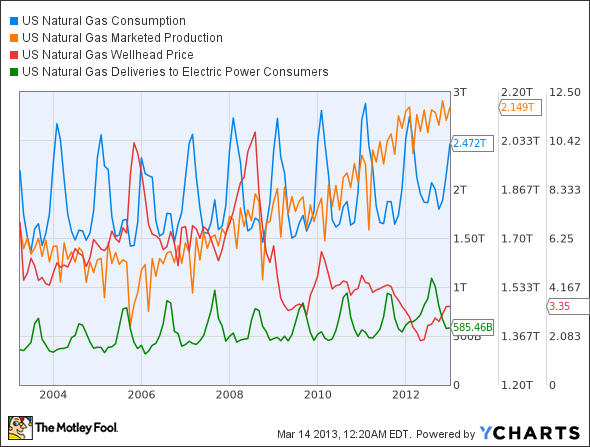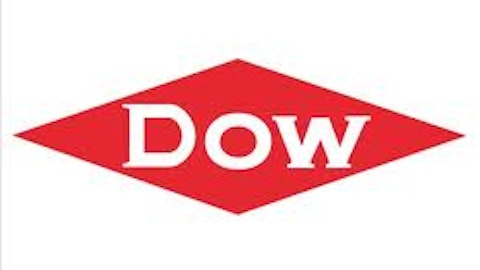Over the past decade, the emergence of shale fracking has unlocked a natural gas bonanza in the United States. Production has exploded, and prices have fallen so low that natural gas fuel, chemical production, and even exports have become economic possibilities. But what’s the best path forward?

Dominion Resources, Inc. (NYSE:D)
We asked four of our top energy analysts what policy the U.S. should encourage to exploit this natural resource. Here’s what they thought.
Travis Hoium’s take
There are currently two main uses for natural gas: electricity production and heating. Natural gas vehicles are a nice side business that I believe will grow, but they’re far from demanding a significant portion of our natural gas resources. Electricity production is a great use for natural gas, but at this point we’re displacing domestic coal instead of imports, so it’s a wash from a policy standpoint. Electricity consumption is also stagnant to declining slightly, so this isn’t exactly a growth avenue for natural gas outside of the replacement of coal.
US Natural Gas Consumption data by YCharts.
Even with the growth of natural gas in electricity generation, we’re simply not consuming enough natural gas domestically to make a dent in the potential production windfall. Production would be even higher in 2012, but prices have been so low that driller all but stopped drilling for natural gas, choosing to drill for oil instead.
If we’re going to make a significant impact on the economy, we need to begin exporting natural gas to countries that could use the low-cost fuel. The Federal Energy Regulatory Commission recently published its estimates for March 2013 landed prices of liquefied natural gas. Here are a few of the notable prices.
| Location | Price ($/MMBtu) |
|---|---|
| Lake Charles, La., USA | $3.01 |
| Cove Point, Md., USA | $3.34 |
| United Kingdom | $9.94 |
| South Korea | $17.75 |
| Japan | $19.75 |
| China | $19.35 |
| Rio de Janeiro, Brazil | $16.84 |
Source: Waterborne Energy, Inc., via Federal Energy Regulatory Commission
Since energy is all about supply and demand, you can see we have a world of demand at our fingertips. From a supply side, prices in the U.S. are as low as they are because we have too much production, which I mentioned has been cut back dramatically over the past year.
We should open up export markets, which would increase production, raise prices to sustainable levels, and increase exports, which are all good for the U.S. economy.
Maxx Chatsko’s take
Rather than comparing domestic LNG export capacity with that of world leaders Qatar and Australia, investors should be comparing domestic cracker capacity. What does a cracker facility do? Crackers take ethane and methane found in natural gas and convert them into high-value products, such as ethylene and polyethylene, that are used in plastics and chemical derivatives. Both countries have worked hard to cultivate their manufacturing advantage — maybe a little too successfully. Countries in the Middle East, which has the lowest ethane prices in the world, have essentially run out of additional ethane supply and are now turning to more expensive feedstocks such as naphtha, propane, and butane.
This creates a massive opportunity for American companies, which are wasting no time getting started. Royal Dutch Shell plc (ADR) (RDS.A) recently chose a site just outside Pittsburgh for a potential world-scale ethane cracker facility in the heart of the Marcellus Shale that will produce more than 1 million tons of polyethylene per year. The chemical serves as a building block for everyday items such as packaging materials, artificial joints, bulletproof vests, and water pipes. See the long-term possibilities for a revitalized manufacturing base yet?
LNG exports will provide an important trade capability for the United States, but turning natural gas into value-added products adds a layer of security from worldwide pricing volatility. It could also have a tremendous effect on the economy by providing jobs and domestically produced products. In fact, one report estimated that the planned Shell plant will create up to 8,200 permanent jobs in the surrounding region and that the number could soar as high as 20,000 if manufacturing plants spring up to take advantage. If that happened, more than than 1 in 10 people of the total population would be supported indirectly by Shell’s presence. Therefore, restricting LNG exports is the best possible move for a more competitive America.
Matt DiLallo’s take
While there are compelling arguments to curb exporting our excess gas, I’m not completely convinced by the logic behind protecting our production. It wasn’t that long ago that we feared that we wouldn’t have enough natural gas to support our economy. To lock up supply, we built several natural gas import facilities, such as Dominion Resources, Inc. (NYSE:D)‘s Cove Point LNG Terminal in Maryland. Today, this terminal and others like it are being prepped for export.
Why is it OK for our country to import gas when we needed it, but it’s not a good idea to export it when we have it in abundance? It is true that exporting gas would increase the cost to consumers both small and large. However, would you carry the logic and suggest we shouldn’t export corn because it makes the costs go up for consumers? If we want to be part of the global economy, then we need to give in the same way that we take.
Now, I don’t favor unfettered exports. Instead there should be rules governing our gas exports, just as rules govern the rest of our economy. I’d favor a slow ramp-up of exports tied to production targets and pricing. I’d also not be opposed to placing a tariff on exports if, and only if, those funds are used to increase the availability of renewable energy in the United States.
The other thing to consider is that higher-cost natural gas isn’t such a bad idea. Sure, it’ll crimp profits at the heavy users, but it also will spur new drilling activity, which would create jobs. Finally, there’s something to be said for scarcity. If gas were more valuable, we wouldn’t see it being flared with abandon in places such as the Bakken. Instead, we’d protect its value. Cheap gas makes us lazy, just as expensive oil causes us to conserve.
Tyler Crowe’s take
We export massive quantities of coal to China and India, we refine gasoline and diesel for Venezuela, and according to the EIA, each year we export 1.6 trillion cubic feet of — you guessed it — natural gas to places all around the world. The lion’s share of that went to our free-trade partners in Canada and Mexico, but some of that did make its way to non-free trade partners, including India, Japan, and Brazil. So it seems a bit odd to argue against something we already do.
If there’s a market out there for it, then by all means pursue that market. What concerns me more is that the LNG export business will have diminishing returns for two major reasons:
Increased domestic demand. Domestic companies want to take advantage of this cheap resource, too. There are the obvious ones, such as utility companies, but we also have chemical companies such as Enterprise Products Partners L.P. (NYSE:EPD) and The Dow Chemical Company (NYSE:DOW) building massive facilities to crack ethane for chemical feedstocks, and innovative thinkers Westport Innovations Inc. (USA) (NASDAQ:WPRT) and Clean Energy Fuels Corp (NASDAQ:CLNE) that are turning the idea of natural gas as a transportation fuel into a reality. When demand picks up in the U.S., local prices will go with it.
Lower natural gas prices in foreign markets. It took less than a decade for the U.S. to realize our natural gas boom, and several countries have proven that they have very large shale deposits as well. We have proven that the technology is out there to access these resources in an economical manner. So when they do tap these sources, foreign prices will start to drop much like they did here.
Both of these elements could squeeze margins for LNG exporters from either end, and it could potentially price them out of profitability. So feel free to export — just know that these two elements are working against you.
Foolish bottom line
The debate will continue over whether the U.S. should use cheap natural gas to spur new uses here or export it for a profit to other parts of the world. Weigh in with your thoughts in our comments section below.
The article What’s the Best Natural Gas Policy for the United States? originally appeared on Fool.com and is written by Travis Hoium, Tyler Crowe, Matt DiLallo, and Maxx Chatsko
Fool contributor Matt DiLallo owns shares of Enterprise Products Partners and Westport Innovations. Fool contributors Maxx Chatsko and Travis Hoium have no position in any stocks mentioned. Fool contributor Tyler Crowe owns shares of Westport Innovations. The Motley Fool recommends Clean Energy Fuels, Dominion Resources, Enterprise Products Partners, and Westport Innovations and owns shares of Westport Innovations.
Copyright © 1995 – 2013 The Motley Fool, LLC. All rights reserved. The Motley Fool has a disclosure policy.





